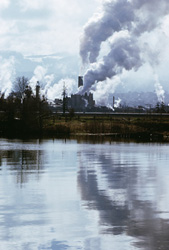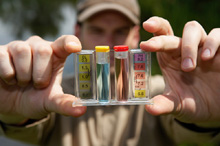Toxic Coal Ash Stored in 32 States a ‘Risk to Human Health and the Environment’
by www.SixWise.com
Coal ash is a byproduct of coal-fired power plants. The waste, which is a mixture of noncombustible ingredients of coal and the ash trapped by equipment designed to reduce air pollution from the plants, has become an increasing burden as electricity needs have increased, as have the regulations restricting emissions from power plants.
|

Most coal ash is stored in ponds located on waterways, which increases the risks that the toxic waste could spread.
|
In 2005, the most recent year for which data is available, the Associated Press found that 721 power plants produced nearly 96 million tons of coal ash. Some of the waste was transferred to landfills while another portion was sold for use in concrete, but about 20 percent of this, or close to 20 million tons, was put into surface ponds.
What are Coal Ash Ponds, and What’s All the Concern About?
Some 300 ponds for coal ash exist in 32 states around the nation, with Indiana, Ohio, Kentucky, Georgia and Alabama storing the most. These ponds are subject to very little regulation, despite the Environmental Protection Agency (EPA) saying eight years ago that it wanted to set up national standards to do so. Because the EPA has not yet addressed the issue, the ponds are subject to less regulation than landfills that accept household garbage.
“Your household garbage is managed much more consistently” than coal combustion waste, Dr. Thomas A. Burke, an epidemiologist at the Johns Hopkins Bloomberg School of Public Health, told the New York Times. “It’s such a large volume of waste, and it’s so essential to the country’s energy supply; it’s basically been a loophole in the country’s waste management strategy.”
The regulations that do exist vary by state, and most of the ponds have no liners and no monitors in place to ensure that the toxins held within do not leak into underground aquifers. Already, leaks and ruptures in several states have contaminated surrounding land and water supplies, and the EPA has suggested that contamination may be more widespread than is realized due to lack of monitoring and poor state records.
|

In most cases, the areas surrounding coal ash ponds are not monitored to ensure their safety.
|
As of 2007, there were 24 cases of water pollution linked to coal ash ponds or landfills, spread throughout 13 states, and another 43 cases where coal ash was the likely cause of the pollution.
Most recently, in December 2008 a coal ash pond in East Tennessee ruptured, spewing a billion gallons of the toxic waste over 300 acres of land.
Just what types of risks are involved here? Coal ash is a concentrated source of arsenic, lead, mercury and many other contaminants. It is also radioactive. Not surprisingly, according to the EPA the wastes "have the potential to present danger to human health and the environment."
Also according to the EPA, coal ash poses an increased risk of cancer when metals from the ponds leach into drinking water sources. It’s also been linked to birth defects, and tadpoles and certain fish species have also suffered deformities as a result of coal ash leaks and spills.
As for when regulations may be enacted to help clean things up, it doesn’t appear to be anytime soon.
|
The Ultimate Kitchen Filtration and Enhancement System
The Wellness Kitchen combines the best filtration and enhancement technologies to deliver the purest and most natural tasting water available. It effectively reduces harmful contaminants, while at the same time enhancing the water with delicate ions and minerals.
Find out for yourself why hundreds of thousands of users including physicians, athletes and health-conscious individuals make the Wellness Water Filtration and Enhancement Systems their choice for a lifetime.
Learn More Now!
|
“We’re still working on coming up with those standards,” Matthew Hale, director of the office of solid waste at the EPA, told the New York Times. “We don’t have a schedule at this point.”
A Simple Solution to Protect Your Family’s Water
Whether or not you’re in the vicinity of a coal ash pond or any other toxic waste area, it’s a good idea to make sure that your family’s drinking water is safe.
According to the EPA, consuming contaminated tap water over time that contains excessive levels of chemicals (such as disinfection by-products, solvents, and pesticides), radionuclides (such as radium), and minerals (such as arsenic) can lead to chronic health effects such as cancer, liver or kidney problems, or reproductive difficulties.
To put your mind at ease and get safe, superior quality water from your own kitchen, Sixwise.com highly recommends The Wellness Kitchen Water Filter. It reduces chlorine, chloramines, cysts, VOCs, pesticides, and herbicides below detectable levels for the life of the filter.
The Wellness Kitchen combines the best filtration and enhancement technologies to deliver the purest and most natural tasting water available. It effectively reduces harmful contaminants, while at the same time enhancing the water with adding important yet delicate wellness "ions and minerals" that your body needs.
Your health is simply too important to gamble with, and that’s why we at Sixwise.com believe you’re better off safe than sorry. If you choose not to filter your family’s water, we highly recommend getting a sample independently tested so you can be sure it’s safe for you to drink.
Recommended Reading
What's Really in Bottled Water? New Study Reveals the Disturbing Truth
Five Things to be Cautious of Regarding Your Tap Water and the Safer Alternatives
Sources
Yahoo News January 9, 2009
The New York Times January 7, 2009
Scientific American December 23, 2008